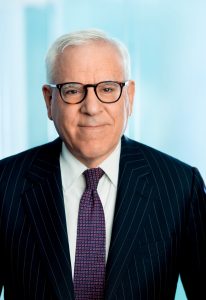 DAVID M. RUBENSTEIN is a Co-Founder and Co-Executive Chairman of The Carlyle Group, one of the world’s largest and most successful private investment firms. He served as Chief Counsel to the U.S. Senate Judiciary Committee’s Subcommittee on Constitutional Amendments before becoming the Deputy Assistant to the President for Domestic Policy during the Carter Administration. He also practiced law in both New York City and Washington, D.C.
DAVID M. RUBENSTEIN is a Co-Founder and Co-Executive Chairman of The Carlyle Group, one of the world’s largest and most successful private investment firms. He served as Chief Counsel to the U.S. Senate Judiciary Committee’s Subcommittee on Constitutional Amendments before becoming the Deputy Assistant to the President for Domestic Policy during the Carter Administration. He also practiced law in both New York City and Washington, D.C.
Mr. Rubenstein is a current or past board member of dozens of non-profit organizations, including the John F. Kennedy Center for the Performing Arts, the Smithsonian Institution and Johns Hopkins Medicine.
Mr. Rubenstein is an original signer of The Giving Pledge and a recipient of the Carnegie Medal of Philanthropy and the MoMA’s David Rockefeller Award, among other philanthropic awards. He is also the host of The David Rubenstein Show and the author of The American Story and How to Lead.
Held by Paul Albert Fuchs
 PAUL ALBERT FUCHS, Ph.D., the David M. Rubenstein Research Professor and Director for Research in Otolaryngology-Head and Neck Surgery, joined the Johns Hopkins faculty in 1995. He holds joint appointments in the departments of Biomedical Engineering and Neuroscience and is Director of the David M. Rubenstein Precision Medicine Center of Excellence, Director of the Center for Hearing and Balance and Co-Founder of the Center for Sensory Biology in the Institute for Basic Biomedical Sciences of the Johns Hopkins University School of Medicine.
PAUL ALBERT FUCHS, Ph.D., the David M. Rubenstein Research Professor and Director for Research in Otolaryngology-Head and Neck Surgery, joined the Johns Hopkins faculty in 1995. He holds joint appointments in the departments of Biomedical Engineering and Neuroscience and is Director of the David M. Rubenstein Precision Medicine Center of Excellence, Director of the Center for Hearing and Balance and Co-Founder of the Center for Sensory Biology in the Institute for Basic Biomedical Sciences of the Johns Hopkins University School of Medicine.
Dr. Fuchs’ laboratory has been funded continuously by the NIH since 1984. He has been instrumental in discovering how electrical signals are initiated and processed by mechanosensory hair cells and neurons of the inner ear. Early on his team identified a molecular mechanism for electrical tuning in the inner ear. Much of his work since then has been dedicated to the mechanism of feedback inhibition of the inner ear by brain neurons. This led to the functional definition of an unusual nicotinic cholinergic receptor whose gene was identified by the group of A.B. Elgoyhen in Buenos Aires. The Fuchs and Elgoyhen groups have collaborated on extensive studies of cochlear inhibition, showing among other things that enhanced cholinergic function can protect the ear from acoustic trauma (PLoS Biology, 2009). This makes the pharmacologically unique nicotinic receptor of the inner ear a premier target for novel therapeutic strategies. Together with his department colleague, Elisabeth Glowatzki, Ph.D., they launched a novel approach to studies of inner ear synapses which led to publications in Science (2000), Nature Neuroscience (2002) and many others. Most recently, their collaboration led to discovery of a subset of cochlear afferent neurons that may serve as acoustic pain sensors of the inner ear, published in part in Nature (2009) and Proceedings of the National Academy (2015).
Dr. Fuchs is a dedicated and highly regarded educator, a consistently highly ranked faculty member for JHU medical, graduate and undergraduate courses for more than two decades, as well as an instructor/lecturer for national and international programs.
He serves on federal and international advisory boards and is past-president of the Association for Research in Otolaryngology. He has published over eighty peer-reviewed articles, edited and co-authored The Oxford Handbook of Auditory Science: The Ear (Oxford University Press) and co-authored the neurobiology text From Neuron to Brain (Sinauer Press).
 DAVID M. RUBENSTEIN is a Co-Founder and Co-Executive Chairman of The Carlyle Group, one of the world’s largest and most successful private investment firms. He served as Chief Counsel to the U.S. Senate Judiciary Committee’s Subcommittee on Constitutional Amendments before becoming the Deputy Assistant to the President for Domestic Policy during the Carter Administration. He also practiced law in both New York City and Washington, D.C.
DAVID M. RUBENSTEIN is a Co-Founder and Co-Executive Chairman of The Carlyle Group, one of the world’s largest and most successful private investment firms. He served as Chief Counsel to the U.S. Senate Judiciary Committee’s Subcommittee on Constitutional Amendments before becoming the Deputy Assistant to the President for Domestic Policy during the Carter Administration. He also practiced law in both New York City and Washington, D.C.